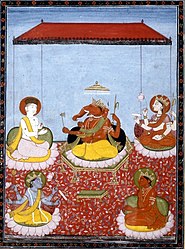
Back Smartisme Afrikaans تقليد السمارتا Arabic سمارتيه ARZ Smartismo BCL স্মার্তবাদ Bengali/Bangla Smarta Catalan Smarta Spanish Smarta Basque سنت اسمارته Persian Tradition smarta French
 The five primary deities of Smarta in a Ganesha-centric panchayatana: Ganesha (centre) with Shiva (top left), Adi Shakti (top right), Vishnu (bottom left), and Surya (bottom right) | |
| Founder | |
|---|---|
| Adi Shankara[1] | |
| Religions | |
| Hinduism | |
| Scriptures | |
| Vedas • Smritisastras | |
| Languages | |
| Sanskrit, Old Tamil | |
| Related ethnic groups | |
| Babburkamme, Iyer, Deshastha, Hoysala Karnataka Brahmins, etc |

The Smarta tradition (Sanskrit: स्मार्त, IAST: Smārta), also called Smartism, is a movement in Hinduism that developed and expanded with the Puranas genre of literature.[2] It reflects a synthesis of four philosophical strands, namely Uttara Mīmāṃsā, Advaita, Yoga, and theism.[3] The Smarta tradition rejects theistic sectarianism,[3] and is notable for the domestic worship of five shrines with five deities, all treated as equal – Ganesha, Shiva, Shakti, Vishnu and Surya.[4] The Smarta tradition contrasted with the older Shrauta tradition, which was based on elaborate rituals and rites.[2][5] There has been a considerable overlap in the ideas and practices of the Smarta tradition with other significant historic movements within Hinduism, namely Shaivism, Brahmanism, Vaishnavism, and Shaktism.[6][7][8]
The Smarta tradition developed during (early) Classical Period of Hinduism around the beginning of the Common Era, when Hinduism emerged from the interaction between Brahmanism and local traditions.[9][10] The Smarta tradition is aligned with Advaita Vedanta, and regards Adi Shankara as its founder or reformer.[11] Shankara championed the thesis that ultimate reality is impersonal and Nirguna (attributeless) and any symbolic god serves the same equivalent purpose.[12] Inspired by this belief, the Smarta tradition followers, along with the five Hindu gods, include a sixth impersonal god in their practice.[12] The tradition has been called by William Jackson as "advaitin, monistic in its outlook".[13]
The term Smarta also refers to Brahmins who specialise in the Smriti corpus of texts named the Grihya Sutras, in contrast to Shrauta Sutras.[14][15][16][17] Smarta Brahmins, with their focus on the Smriti corpus, are contrasted from Srauta Brahmins, who specialise in the Śruti Corpus, that is, rituals and ceremonies that follow the Vedas.[18]
- ^ U Murthy (1979), Samskara, Oxford University Press, ISBN 978-0195610796, p. 150.
- ^ a b Flood 1996, p. 113.
- ^ a b Cite error: The named reference
Milner 1994 p. 195was invoked but never defined (see the help page). - ^ "Smarta sect | Hinduism". Encyclopedia Britannica.
- ^ Knipe 2015, pp. 36–37.
- ^ Flood 1996, pp. 113, 134, 155–161, 167–168.
- ^ Sanderson, Alexis. "The Saiva Age: The Rise And Dominance Of Saivism During The Early Medieval Period". In Genesis And Development of Tantrism, Edited By Shingo Einoo. Tokyo: Institute Of Oriental Culture, University Of Tokyo, 2009. Institute Of Oriental Culture Special Series, 23, pp. 276–277.
- ^ John Shephard (2009), Ninian Smart On World Religions, Ashgate, ISBN 978-0754666387, p. 186.
- ^ Hiltebeitel 2013.
- ^ Flood 1996.
- ^ U Murthy (1979), Samskara, Oxford University Press, ISBN 978-0195610796, p. 150.
- ^ a b L. Williamson (2010), Transcendent in America: Hindu-inspired Meditation Movements as New Religion, New York University Press, ISBN 978-0814794500, p. 89.
- ^ William Jackson (1994), Tyāgarāja and the Renewal of Tradition, Motilal Banarsidass, ISBN 978-8120811461, p. 218.
- ^ Knipe 2015, p. 36.
- ^ Buhnemann, Gudrun, Puja: A Study In Smarta Ritual, Publications Of The De Nobili Research Library, Gerold & Co., Vienna, 1988. pp. 32–33.
- ^ Buhnemann, Gudrun, Mandalas And Yantras In The Hindu Traditions, Leiden, Brill, 2003. p. 57. "Initially A Brief Explanation Of The Word Smarta May Be In Order. Smarta Is A Rather Loosely Used Term Which Refers To A Brahmin Who Is An 'Adherent Of The Smrti' And Of The Tradition Which Is 'Based On The Smrti'."
- ^ Flood, Gavin (1996), An Introduction To Hinduism, Cambridge University Press. p. 17. "There Is Also An Important Tradition Of Brahmans Called Smartas, Those Who Follow The Smrti Or Secondary Revelation ..." p. 56. "The Brahmans Who Followed The Teachings Of These Texts Were Known As Smartas, Those Who Followed The Smrtis ..." p. 113. "The Brahmans Who Followed The Puranic Religion Became Known As Smarta, Those Whose Worship Was Based On The Smrtis, Or Pauranika, Those Based On The Puranas."
- ^ Gavin Flood (2006). The Tantric Body: The Secret Tradition of Hindu Religion. I. B. Tauris. pp. 6–7. ISBN 978-1-84511-011-6.